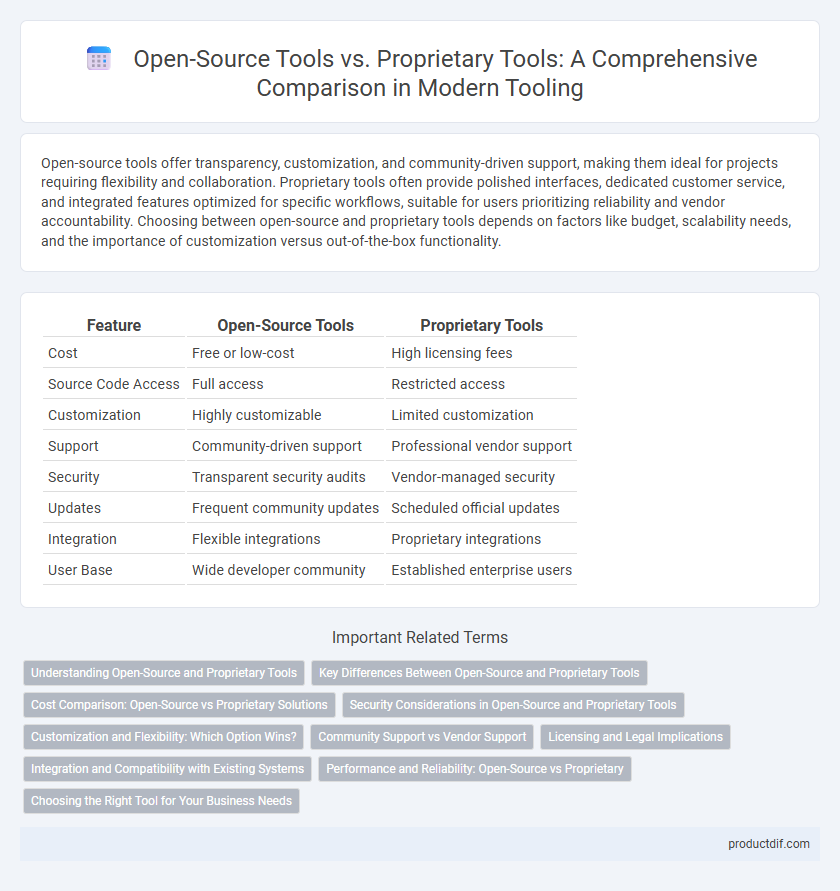Open-source tools offer transparency, customization, and community-driven support, making them ideal for projects requiring flexibility and collaboration. Proprietary tools often provide polished interfaces, dedicated customer service, and integrated features optimized for specific workflows, suitable for users prioritizing reliability and vendor accountability. Choosing between open-source and proprietary tools depends on factors like budget, scalability needs, and the importance of customization versus out-of-the-box functionality.
Table of Comparison
| Feature | Open-Source Tools | Proprietary Tools |
|---|---|---|
| Cost | Free or low-cost | High licensing fees |
| Source Code Access | Full access | Restricted access |
| Customization | Highly customizable | Limited customization |
| Support | Community-driven support | Professional vendor support |
| Security | Transparent security audits | Vendor-managed security |
| Updates | Frequent community updates | Scheduled official updates |
| Integration | Flexible integrations | Proprietary integrations |
| User Base | Wide developer community | Established enterprise users |
Understanding Open-Source and Proprietary Tools
Open-source tools offer transparent code access, enabling customization and community-driven improvements that enhance flexibility and innovation. Proprietary tools provide dedicated support, consistent updates, and integrated features designed for specific business needs, often ensuring reliability and security. Understanding the trade-offs between open-source adaptability and proprietary stability helps organizations choose tools aligned with their technical requirements and budget constraints.
Key Differences Between Open-Source and Proprietary Tools
Open-source tools offer access to source code, enabling customization and community-driven improvements, while proprietary tools restrict access to their code and rely on vendor-controlled updates. Open-source options generally provide cost advantages and flexibility, whereas proprietary tools often come with dedicated support, regular maintenance, and potentially enhanced security features. Decision-making depends on factors such as budget, required control, scalability, and long-term support needs.
Cost Comparison: Open-Source vs Proprietary Solutions
Open-source tools offer significant cost advantages due to their zero licensing fees and community-driven development, which reduces expenses related to updates and support. Proprietary tools often involve substantial upfront investments, recurring subscription costs, and potentially high fees for customization and technical support. Despite higher expenses, proprietary solutions may provide dedicated customer service and advanced features that justify the cost for enterprise-level applications.
Security Considerations in Open-Source and Proprietary Tools
Open-source tools offer transparency that allows security vulnerabilities to be identified and patched quickly by a global community, enhancing their reliability in security-critical environments. Proprietary tools often provide dedicated support and regular updates backed by commercial entities, which can ensure timely responses to vulnerabilities but may lack visibility into the source code for independent audits. Evaluating security considerations requires balancing the open review benefits of open-source tools against the controlled, vendor-managed protections inherent in proprietary solutions.
Customization and Flexibility: Which Option Wins?
Open-source tools offer unparalleled customization and flexibility, allowing developers to modify source code to fit specific needs without restrictions. Proprietary tools, while often providing polished interfaces and dedicated support, usually limit customization due to closed-source frameworks. For projects requiring tailored solutions and adaptability, open-source options typically provide a significant advantage over proprietary counterparts.
Community Support vs Vendor Support
Open-source tools benefit from large, active communities that provide extensive peer support, frequent updates, and collaborative problem-solving. Proprietary tools offer dedicated vendor support with guaranteed response times, professional assistance, and often tailored solutions. Community support typically enables flexibility and innovation, while vendor support ensures reliability and accountability for critical business applications.
Licensing and Legal Implications
Open-source tools offer licensing models such as GPL, MIT, and Apache, which provide users with the freedom to modify, distribute, and use the software without significant legal restrictions. Proprietary tools, governed by strict End-User License Agreements (EULAs), typically limit usage, modification, and redistribution, imposing legal obligations and potential penalties for violations. Understanding these licensing frameworks is crucial for compliance, risk management, and aligning tool choice with organizational goals and intellectual property policies.
Integration and Compatibility with Existing Systems
Open-source tools offer extensive integration capabilities through customizable APIs and community-driven plugins, enhancing compatibility with diverse existing systems. Proprietary tools often provide streamlined integration with specific platforms but may limit adaptability due to closed-source restrictions. Evaluating the interoperability requirements and flexibility needs of your infrastructure helps determine the optimal choice between open-source and proprietary solutions.
Performance and Reliability: Open-Source vs Proprietary
Open-source tools benefit from community-driven development, leading to frequent updates and rapid bug fixes that enhance performance and reliability. Proprietary tools often offer optimized performance through dedicated resources and rigorous testing, ensuring high stability in mission-critical environments. Evaluating specific use cases is essential, as open-source flexibility contrasts with proprietary tools' controlled ecosystems for consistent reliability.
Choosing the Right Tool for Your Business Needs
Open-source tools offer customizable, cost-effective solutions with community-driven support, making them ideal for businesses seeking flexibility and scalability. Proprietary tools provide dedicated technical support, regular updates, and advanced features, ensuring reliability and security for mission-critical operations. Assessing factors like budget, integration requirements, and long-term support helps businesses select the optimal tool aligned with their strategic goals.
Open-source tools vs Proprietary tools Infographic

 productdif.com
productdif.com